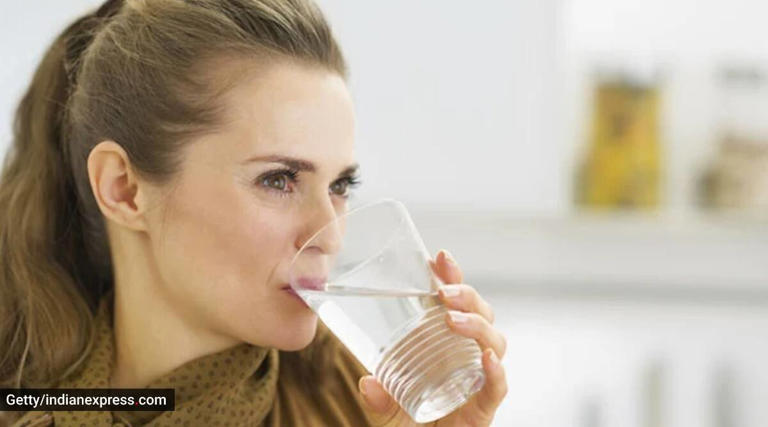Story by Lifestyle Desk
Here’s what to know about uric acid levels and kidney function:
A less commonly spoken health risk among those associated with lack of adequate water intake is less uric acid levels in the body. Notably, while uric acid is a waste product, produced during the breakdown of various foods and drinks, its production too affects your health.
“Normally, uric acid dissolves in the blood and is discarded by the kidneys through urine. But in some cases, the body produces excess uric acid or the kidney dysfunction doesn’t excrete the required amount of uric acid, resulting in hyperuricemia. Long-term hyperuricemia can lead to development of gout, a painful form of arthritis, or kidney stones,” Dr Avanish Arora, director – Urology and Uro-Oncology & Senior Consultant – Robotic Urology, Nanavati Max Super Specialty Hospital, Mumbai told indianexpress.com.
According to a social media page called HealthHatch, water is the most neglected nutrient.
“Lack of water is known to cause a number of health issues including kidney stones, dehydration etc. Research has shown that poor water intake is associated with high uric acid in the body. Our thirst signals are quite weak and hence, we don’t really end up drinking much water unless we are dehydrated and extremely thirsty. It’s important to understand that low water intake can lead to a number of health issues and we shouldn’t take it lightly,” the caption read.
Apart from reducing high purine foods, you need to increase your water intake to reduce the elevated uric acid,” the caption added. Notably, high-purine foods are alcohol, organ meats, certain seafood, and sweetened beverages.
How does drinking water help?
According to Dr Arora, drinking plenty of water dilutes the uric acid in the blood. “Being hydrated also supports healthy kidney function and seamless elimination of uric acid from the body,” said Dr Arora.
By increasing urine volume, water intake facilitates the removal of uric acid from the body, reducing the risk of crystal formation, said Dr Urman Dhruv, consulting physician, director, Department of Internal Medicine and Diabetes, HCG Hospitals, Mithakhali, Ahmedabad. “Additionally, staying well-hydrated can help prevent the reabsorption of uric acid in the kidneys, further aiding in its elimination. Proper hydration also supports kidney function, ensuring optimal filtration and uric acid clearance from the bloodstream,” said Dr Urman.
Concurring, Dr Santosh Pandey, naturopath and acupuncturist, Rejua Energy Center, Mumbai said that if the stones are tiny, they may pass out of your body through urine. “Drinking plenty of water helps your kidneys flush out uric acid faster. So as small stones will be removed, there is no chance of growth in the size of uric acid crystals,” said Dr Pandey.
However, it is essential to note that while water intake is beneficial, excessive consumption alone may not be sufficient to manage uric acid levels in individuals with underlying health conditions or a predisposition to gout.
“It is also equally true that high uric acid does not always lead to gout and asymptomatic uric acid may not require treatment until it goes above 11 mg in males or 10 mg in females,” explained Dr Urman urging that generalized advice should not be taken as customized medical advice.
